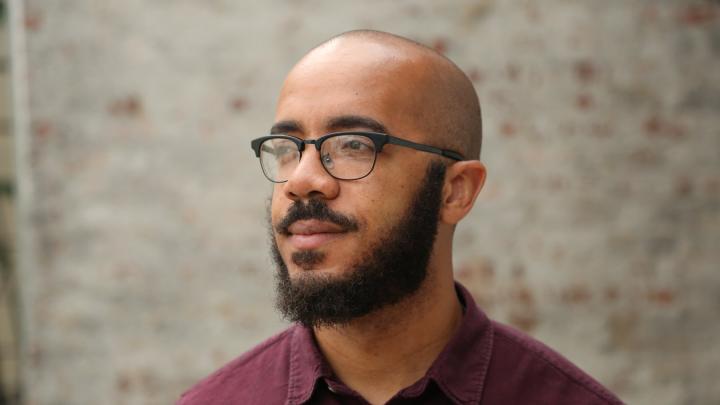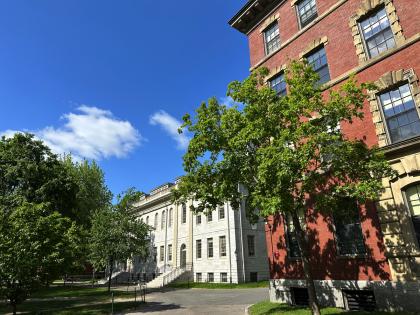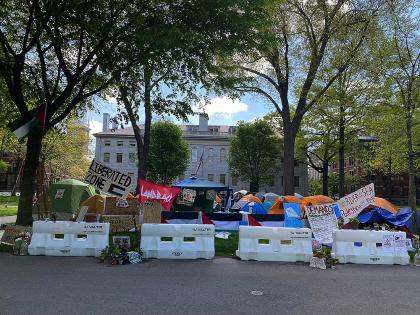Before you get to any of the poems in Clint Smith’s new book, Counting Descent—some with titles like “How to Fight,” and “No More Elegies Today,” and “Ode to the Only Black Kid in the Class”—you’ll find an epigraph from Ralph Ellison’s interview with the Paris Review in 1954. It reads: “I recognize no dichotomy between art and protest.”
Smith, a third-year Ph.D. candidate in education, thinks about that quote a lot. For him, Ellison’s words are deeply felt. And deeply lived. “It doesn’t even make sense to me that art and protest would be separate,” he says. “Part of what it means to be an artist is to imagine the world as it could be, and to not be confined by what seem like the political possibilities of the day. To reject false caricatures of humanity. And to complicate our understanding of history.”

People often ask if Counting Descent is a book about “the black experience.” Not exactly, he tells them; it is his black experience. Everything is in there: the childhood in New Orleans, full of gumbo and books and family affection. His parents dancing in the kitchen to Frankie Beverly & Maze. One grandfather (“a quarter century / older than his right to vote”) who cleaned floors for white people; and the other, Smith’s namesake, a zoologist who as a teenager had to move to a different Mississippi county because his own didn’t have a high school for blacks. Smith himself, a runner and standout soccer player (with, the poems attest, no basketball jump shot), turned 17 on August 25, 2005. Four days later, Hurricane Katrina destroyed his family’s home. “I come from a city that is drowning,” he would later write in a poem called “what is left,” “while being told it is rinsing itself clean.”
One night during a summer internship in New York, he found his way to the Nuyorican Poets Café, a spoken-word mecca on the Lower East Side. The first poem he heard was from a woman with cerebral palsy. Smith was transfixed—and transformed: “I wanted to be a part of that.” He became a National Poetry Slam champion, with spoken-word poems on immigration, food deserts, and other subjects that landed on YouTube, where hundreds of thousands of people have watched them. “History Reconsidered,” which he performed often during his Counting Descent book tour, is written as a letter to five slave-owning American presidents: “James Madison, when you wrote to Congress that black people should count as three-fifths of a person, how long did you have to look at your slaves to figure out the math?” Another stand-by is “My Father Is an Oyster,” a filial love song prompted a few years ago by his father’s sudden illness. (He is healthy again, after a kidney transplant.) Smith first performed it standing with his family beside the hospital bed.
In August 2014, during the first week of Smith’s doctoral program, Michael Brown was killed in Ferguson, Missouri. That event, and everything that followed—the grief, the protests, the Black Lives Matter movement, more police shootings spawning further grief and protests—has shaped his life and work. That semester, he began writing the poems that would become Counting Descent. Its shortest poem, “Canon,” reads: “Our stars weren’t meant for / their sky. We have never known / the same horizon.” In another, “How to Make an Empty Cardboard Box Disappear in 10 Steps,” the innocuous-sounding title darkens as the poem unveils a parade of tragic and familiar names: Trayvon Martin, Renisha McBride, Jordan Davis, Michael Brown, Eric Garner, Freddie Gray. The way to get rid of a cardboard box, the poem instructs, is to make signs from it, for protesting the deaths of slain African Americans.
Smith didn’t figure on becoming a teacher: after college, he worked in public health in South Africa, en route, he thought, to a career in international development. But a Teach For America recruiter put a bug in his ear: what about the help needed in your own back yard? After a year in Johannesburg, he went to Prince George’s County, Maryland, to teach English to mostly poor, mostly nonwhite tenth-graders. “It’s one of the most important things that’s ever happened to me,” he says.
When he came to Cambridge, Smith returned to teaching, this time at a state prison in Massachusetts, where he traveled every other week to discuss great literature with men serving life sentences. “I wanted to find something that would keep me grounded while I was in grad school,” he says, “something that would remind me why I came.” Before long, it became the reason why.
Initially planning to study how young people cultivate a civic and social identity, Smith kept thinking instead about education and incarceration. The prisoners had formed a longstanding and deeply rooted literary community, reading and writing together for years, Smith says: “It was the teachers who cycled in and out.” The men were thoughtful and brilliant in a way he was not prepared for. Smith began to wonder whether recidivism and after-release employment were really the best metric for assessing the overall value of prisoner education. For the almost 200,000 people serving life sentences in the United States, that measure makes no sense. “It’s almost a human-rights question,” Smith says: “Just because society will never utilize these men’s vocational skills one day out in the world, does that mean we shouldn’t be investing in them as people?” He continues, “Part of what literature does, or history, or any education that’s not geared toward specific vocational training, is that it makes you a fuller person, a more empathic person, more compassionate; you’re more likely to recognize common threads of humanity in all of us. And I think that’s the case whether you’re teaching high-schoolers or men who are serving life sentences in prison.”
In “How Malcolm Learned to Read,” Smith puts it this way: “Malcolm, could you ever have imagined / what this dictionary would make of you? Do you / remember who you were before you picked up the pen?”








